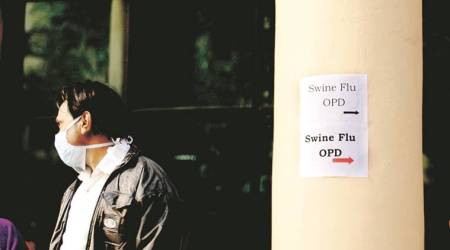 Asked about the sudden spurt in cases, Rawat said they were regularly releasing advisories to spread awareness about vector-borne diseases.(Representational image)
Asked about the sudden spurt in cases, Rawat said they were regularly releasing advisories to spread awareness about vector-borne diseases.(Representational image)
Thirteen new cases of swine flu have been reported in Lucknow since Friday, taking the total number of cases since January to 44. Additional Chief Medical Officer (ACMO) Dr Sunil Kumar Rawat said, “Six of these cases are from Lucknow, while seven are from other districts.” Of the total 44 cases, 11 were detected in Sanjay Gandhi Post Graduate Institute (SGPGI) of Medical Sciences, of which seven were from the LDA Colony, Kanpur Road, said the ADMO, adding that one death due to swine flu had been recorded so far. He confirmed that the fresh 13 cases included an SGPGI doctor, which prompted CMO G S Bajpai to sent a notice to the hospital on Sunday, instructing the administration to take preventive measures to protect their employees from swine flu, including providing them Tamiflu tablets and isolating them if they show symptoms.
“Presently, three patients are getting treatment in SGPGI, three in King George Medical College (KGMC) and two in other hospitals. The rest of the patients are getting treated at home and are being provided with medicines,” Rawat said, adding that none of the patients were in serious condition.
Asked about the sudden spurt in cases, Rawat said they were regularly releasing advisories to spread awareness about vector-borne diseases.
“People need to understand that they should not hug or shake hands with anyone having flu symptoms. In the old times, we had the unsaid rule of isolating anyone with health problems like chicken pox. With the increasing threat of swine flu, we need to do the same,” added the ADMO.
“Most of the time, due to lack of knowledge, we come into contact with people with swine flu and allow the disease to spread. We need to stop this. We need to make people aware and we are working towards that,” he further said.
According to sources, 24 cases of dengue have also been registered in the state capital since January this year. Rawat said dengue larvae can breed in just 5 ml of fresh water, hence water stagnation must be prevented.
“The eggs of the dengue mosquito can survive for as long as one and half years, that is why we always suggest not just removing water from each and every place where it can accumulate, but clean the spot as well. If not, then there is a chance that the eggs might survive and soon after they get water, they will turn into larvae,” added the ADMO.

